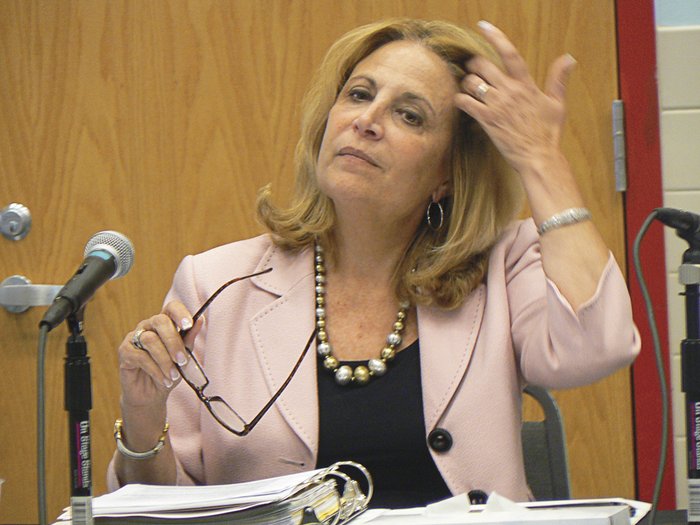After four years of ongoing tensions and long public battles with the teachers’ union, it was no surprise to many school board members that Superintendent of Schools Cynthia Randina tendered her resignation earlier this month. After she spends one more year in the district to fulfill her contract, she will leave to work on her dissertation and will not rule out any other opportunities.
While some board members said that Randina is leaving because of the new salary cap enforced by the governor, which would have led to a $70,000 to $80,000 cut in her salary, others said that politics played a major role.
Leadership
Before Randina stepped into the role of superintendent in September of 2008, Constantino “Gus” Scerbo had held the position for 23 years. Before him, Arthur F. Couch had held the position for 23 years since 1961. The residents of Secaucus were not accustomed to seeing a woman – a Latina, let alone an individual from another town – in this powerful position.
Randina had worked in the Wayne school district since 1996. She was initially hired as the director of elementary education and later promoted to assistant superintendent in 2004.
“We are losing a lot of quality people.” – Salvatore Manente.
____________
Under her leadership, test scores went up, technological improvements were made, the school district was recognized for leadership on anti-bullying issues, and it was also chosen to be part of the educator evaluation pilot program by the state.
Challenges
But the local teachers’ union felt that she did not communicate enough with the faculty about the changes she was implementing. They criticized her hiring choices, communication style, and overall management of the district.
In an interview last year she said she saw the union’s discontent as an unwillingness to let go of what is familiar and embrace someone with new ideas.
“I don’t believe that any leader escapes criticism,” said Randina at the time. “That is part of being a leader.”
Her leadership was challenged on two occasions when the Secaucus Education Association took a nonbinding vote of “no confidence” in her leadership skills in 2010 and 2012, which was led by former union president and current board trustee Robert “Bob” Anderson.
The majority of the school board trustees stood behind her in 2010, issuing a formal statement of “unequivocal support,” yet the trustees did not take the same measures to back the superintendent in 2012.
Politics
It was evident Randina had lost the majority of support she once had on the board, which further crystallized during the most recent election held in April when Thomas Troyer, a major supporter of Randina, lost against newcomers Kelli D’Addetta, Anderson, and incumbent Gary Riebesell.
Troyer ran on a platform to keep politics out of the school district. He had major public opposition from Mayor Michael Gonnelli, who paid for ads against Troyer’s re-election.
Troyer had said in the past that the opposition against the superintendent was politically motivated.
“As the old saying goes, when you get run out of town by the political powers that be, make it look like you’re leading the parade,” said Troyer in a statement last week. “With our superintendent’s resignation, the parade has begun.”
“She is an educator and not a politician,” said Trustee Dora Marra. “Unfortunately in 2012 you have to be a politician.” Both Marra and MaryAnn Weiner spoke in support of the superintendent at the last board meeting, and expressed sadness at her decision.
Salary cap
Anderson said in a recent interview that the main reason he ran for the school board was to oust Randina. He had stated publicly that he would not renew her contract, which was up in June.
“Contractually, something had to be done this month,” said Jack McStowe, board president.
“If a vote was taken for her renewal she wouldn’t have had enough votes to stay on,” said Anderson.
Others said that they didn’t expect Randina would stay in the district given the salary cut she would have to accept.
“I am not surprised that someone doesn’t want to take an $80,000 cut in pay,” said McStowe.
Randina earns $227,000. Gov. Chris Christie has put a cap on superintendent salaries based on school district size. The limit is $157,000 for Secaucus. Because of the cap, a principal and vice principal will earn more than the future superintendent, which a few trustees see as a potential problem. A number of directors, who currently don’t have contracts, also earn six figure salaries that put them within the future superintendent’s salary range.
Some said the salary cap is a limitation in finding a good candidate to fill the superintendent position because they feel it makes Secaucus less competitive.
“The [cap] is why a lot of superintendents are leaving New Jersey and going to New York for higher salaries,” said board member Salvatore Manente. “We are losing a lot of quality people, [and] knowledgeable people with experience.”
“If the district wants to pay more money and feels they can get a top candidate, we should be able to pay them,” said Anderson.
“I think she is going to be difficult to replace,” said Manente. He described Randina as brilliant. “Her mannerisms may not be to people’s liking but it is always done with good intentions.”
Randina plans to serve out the final year left on her contract. She said that she wants to finish her dissertation but is open to opportunities after she leaves the district.
“It is going to be a year of my own self-examination to figure out what the next step is going to be,” said Randina.
Adriana Rambay Fernández may be reached at afernandez@hudsonreporter.com.
